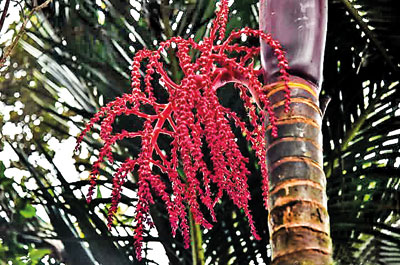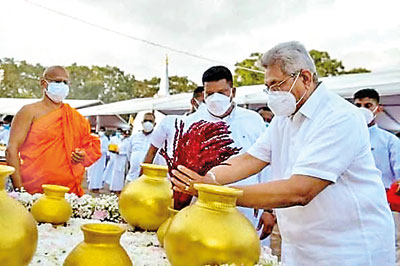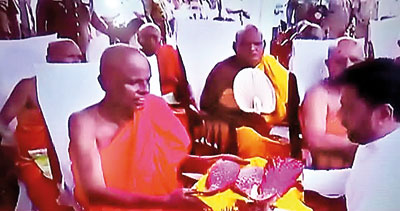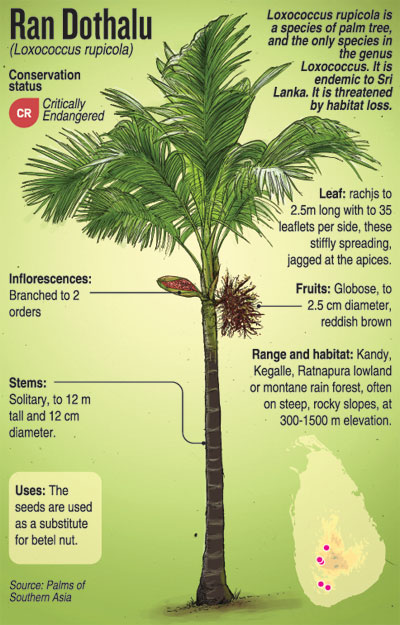News
Offering of enadangered Ran Dothalu by President stirs debate
View(s):By Malaka Rodrigo
A recent religious offering by President Anura Kumara Dissanayake has drawn sharp criticism from conservationists and botanists, reigniting concerns over the use of endangered plants in religious rituals.
The controversy centres around the Ran Dothalu (Loxococcus rupicola), an endangered palm species, which was offered by the President during the Aluth Sahal Mangallaya— the traditional rice harvest ceremony — held on April 4 at the sacred Jaya Sri Maha Bodhi in Anuradhapura.

The Ran Dothalu flower
While the offering of Ran Dothalu would not have been the President’s idea as it was seen being handed to him by organisers, experts say it sets a dangerous precedent. “This endemic flower is endangered. When national leaders use it in public ceremonies, it inadvertently encourages illegal harvesting,” says Bhathiya Gopallawa, a botanist and conservationist.
This is not the first time Ran Dothalu has stirred controversy. A similar incident occurred in 2021 when then-president Gotabaya Rajapaksa offered it at a religious ceremony in Anuradhapura.
Although revered in Sri Lankan Buddhist tradition, especially through folklore linking it to divine offerings, Ran Dothalu had not been widely used in rituals until recent years. Today, however, it is increasingly seen at prominent pilgrimage sites like Adam’s Peak (Sri Pada), the Temple of the Tooth in Kandy, and the Ruwanweli Seya, despite its strict legal protection under the Fauna and Flora Protection Ordinance (FFPO), which prohibits the harvesting or possession of any part of this plant.
Traditionally, offerings of Ran Dothalu were largely confined to regions like Ratnapura, where the plant naturally grows. However, as its cultural popularity has surged over promotions in social media, the demand has risen, leading to unsustainable harvesting practices.
“Being a slender palm, the entire plant is often cut down just to collect its flowers. I’ve witnessed areas where dozens of these palms have been felled,”
said Mr Gopallawa.

President Gotabaya Rajapaksa also offered it at a religious ceremony in Anuradhapura in 2021
Ran Dothalu is not just any plant — it is endemic to Sri Lanka, meaning it is found nowhere else in the world. Moreover, it belongs to a monotypic genus, meaning it is the only species within the genus Loxococcus. “If we lose this species, we lose the entire genus,” emphasised Prof. Siril Wijesundara, former director general of the Department of Botanical Gardens and currently a research professor at the National Institute of Fundamental Studies (NIFS).
Prof. Wijesundara also explained the scientific origin of the plant’s name ‘Rupicola’ comes from Latin — rupes meaning rock or cliff, and colere meaning to dwell. So, it translates to ‘rock-dweller,’ which reflects its preference for rocky habitats in places like Ratnapura.”
According to Buddhist folklore, the deity Sumana Saman is said to have offered Ran Dothalu to the Buddha when inviting him to Samanala Kanda (Adam’s Peak). This legend has further fuelled
the plant’s ritualistic use, especially during pilgrimages to Sri Pada.
In response to this growing trend, the volunteer group Samanala Kanda Rasika Ekamuthuwa (SKRE) has stepped up efforts to inform people.
“We often receive photos on our Facebook page showing Ran Dothalu offerings at Adam’s Peak. That’s when we realised the scale of the problem,” said Achintha Sri Lakmal, one of SKRE’s administrators.
SKRE has launched several awareness campaigns, including placing informational boards at the base of Sri Pada urging pilgrims to avoid using the flower. Their advocacy goes beyond awareness.
“We’ve filed three legal cases so far where evidence was clear, and each time the offenders were fined,” said Dasni Piyasiri, a lawyer and SKRE member. “Ran Dothaluis protected under the FFPO — even harvesting from your own garden is illegal.”

President Anura Kumara Dissanayake offering during the Ran Dothalu at the sahal mangallaya on April 14
One such case involved a family who picked the flower from their private garden.
“The law doesn’t allow removal of any part of this species, regardless of where it grows,” Ms Piyasiri explained. She added that social media images often serve as critical evidence. “Contrary to popular belief, these images are admissible. We’ve successfully defended their authenticity in court, setting important legal precedents.”
Following the recent presidential offering, SKRE has formally written to President Dissanayake, urging him to uphold environmental laws and issue a public apology.
“The President often says that anyone can make a mistake — but what matters is how you correct it. We also need clarity on how a protected plant ended up in his hands,” said Ms Piyasiri.
Amid the controversy, some have raised the idea of cultivating Ran Dothalu for ceremonial use. Prof. Wijesundara welcomes innovative approaches but stresses the importance of proper oversight. “Any cultivation initiative must be organised and supervised to ensure it does not further endanger the species,” he said.
However, many environmentalists fear that the wild harvesting would continue and that religious leaders should help stop this practice.

The best way to say that you found the home of your dreams is by finding it on Hitad.lk. We have listings for apartments for sale or rent in Sri Lanka, no matter what locale you're looking for! Whether you live in Colombo, Galle, Kandy, Matara, Jaffna and more - we've got them all!

